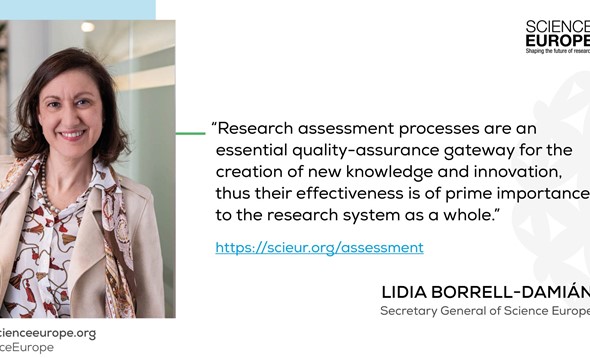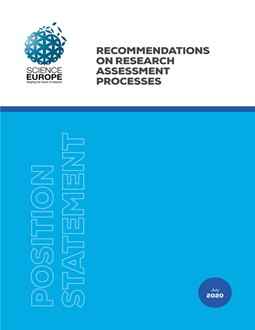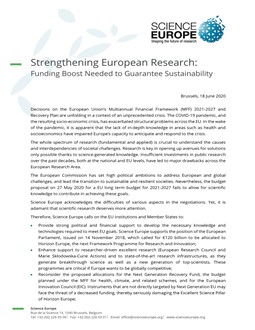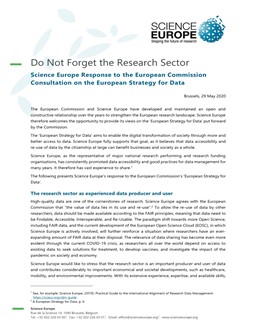Member-only content is available on this page. Please log in to view this content.

What's going on?
566 item(s) found
Position Statement and Recommendations on Research Assessment Processes
Science Europe calls on research funding and performing organisations to continuously evaluate their research assessment processes to ensure that they are effective, efficient, fair, and transparent.
Science Europe urges ‘broad reappraisal’ of R&D assessment
Research organisations urged to disclose their assessment practices and how they address bias.
Draft plans hint at green decade for R&D
Lidia Borrell-Damián, Science Europe Secretary General, quoted in Research Europe saying that a 20 per cent target would be “a good starting point”.
She was commenting, as part of an article on proposals for the European Research Area to include spending targets and a ‘Cern for climate change’
Viewpoint: R&D recovery fund should go beyond the first years of Horizon
Science Europe calls for the European Commission’s recovery package in Horizon Europe to be extended beyond 2024
Broad support for R&D boost as Council restarts budget battle
Science Europe quoted in RP saying that the €94.4bn proposal “fails to allow for scientific knowledge to contribute” to achieving the Commission’s ambitious agenda for digitisation and environmental sustainability.
The Commission’s proposal should also be tweaked to ensure the €13.9bn that will go to Horizon Europe from the recovery fund is shared more equally between the parts of the programme dedicated to applied or basic research, Science Europe said.
It is “essential that substantial funding for all research programmes, and especially the excellent science pillar, is provided for the entire duration” of the 2021-27 budgetary period, Science Europe added.
Gabriel joins MEPs in last-minute bid for strong Horizon Europe budget
Science Europe, quote in Science Business, saying that EU leaders should reconsider the European Commission’s budget proposal for Horizon Europe, as it could be “seriously damaging” for parts of the programme focused on basic research and research mobility.
According to the commission’s budget proposal released in May, most Horizon Europe programmes would lose 3.2 per cent of their budget.
Science Europe says the plan should be reconsidered, so that the recovery money also reaches the coffers of the European Research Council, Marie Skłodowska-Curie Actions and research infrastructures.
Science Europe: Commission budget proposal could ‘seriously damage’ excellent science pillar in Horizon Europe
Science Europe, quoted in Science Business saying that EU leaders should reconsider European Commission’s budget proposal for Horizon Europe, as it could be “seriously damaging” for parts of the programme focused on blue sky research and research mobility.
Strengthening European Research: Funding Boost Needed to Guarantee Sustainability
Science Europe calls on the leaders of the EU to dedicate increased funding to research and innovation at the 19 June European Council meeting on the EU long-term budget and COVID-19 recovery fund.
An increased budget is necessary to meet the ambitious objectives of the European Union for a sustainable, healthy planet, and to ensure the global competitiveness of its research sector.
Science Europe also emphasises the need for sustained European leadership in tackling all COVID-19-incurred challenges.
Europe to Keep Leading COVID-19 Pandemic and Crisis Recovery
Science Europe encourages EU Member States and Associated Countries to keep leading European and global projects to tackle the medical, social, and economic challenges brought on by COVID-19.
Science Europe Members Organisations can contribute with their expertise and experience to build the necessary collaborative approaches within Europe and across the world.
Response to the European Commission Consultation on the European Strategy for Data
Science Europe calls on the European Commission to take into account the important role of the research sector as producer and user of data. The longstanding experience of the research sector should feed into the development of an overarching EU data strategy that promotes data access across sectors.
In its response to the EC consultation on the European Strategy for Data, Science Europe also underlines the need to consider sectoral policies to ensure coherence between overarching and sectoral policies.
Horizon Europe budget proposal provokes pleasure as well as pain
Extra €10.9bn proposed for R&D programme is welcomed, but falls short of expectations.
Science Europe Secretary General quoted in Research Professional saying that she welcomed what she called a “sensible proposal”. “The Commission has done a really good compromise job, so I only hope the member states will be able to approve it,” she said, referring to the short time left before the programmes are due to begin next year.
Lukewarm welcome for plan to prop up Horizon budget with €13.5B pandemic recovery money
There’s more in the pot, but MEPs and research lobbies decry ‘mismatch’ between European Commission’s revised research budget and the post-COVID-19 mountains to be scaled.
Science Europe Secretary General quoted in Science Business, saying that the €13.5 billion addition to the Horizon budget is a positive in a “world of compromises” however, “there is a disappointment that [the budget] isn’t at least €100 billion.”
Leaders hail $8bn fund for Covid-19 R&D
Science Europe Secretary General quoted in Research Europe saying that “Research has to be competitive, no matter who manages the funds,” Open competitive calls are “the first proof of excellence”, she said, and should be part of processes that disburse public funds.
“This should be seen as a first positive step. Now this money needs to be properly used [and] given to the right hands.” It is not certain whether there are enough suitable researchers to do the work world leaders have pledged to fund, she warned. “It’s a market question—to what extent the scientific community is able to absorb all these funds in an efficient way,” she said.
Draft Horizon Europe plan teases assessment and award changes
Research leaders welcome overarching aim of strategy, but express reservations about some proposals.
Science Europe Secretary General, quoted in Research Professional, said that the concepts in the draft strategy were “welcome as a clear outline for the implementation of Horizon Europe”. “Maximising impacts, greater transparency and further simplification, fostering more and better synergies with other EU programmes, ease of access through streamlined information portals…these are issues that have been requested by many stakeholders for many years, including Science Europe.” But one proposed change, a “clearer specification of the expected impacts” of projects, has caused some concern, she added.




























